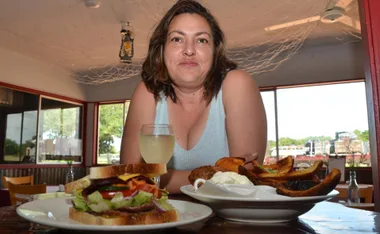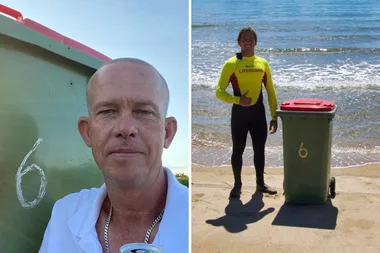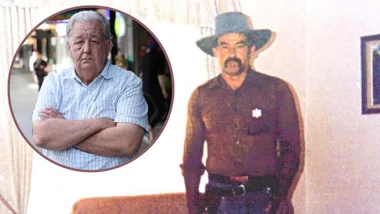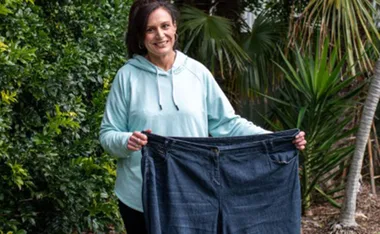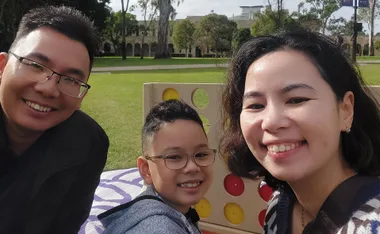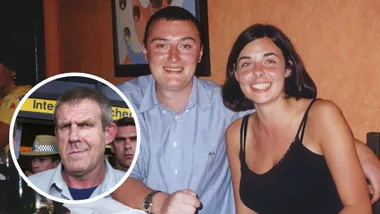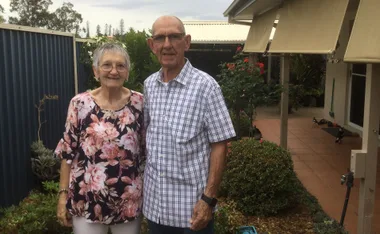HANDS in the air, eyes to the sky and bodies swaying to the music of a live Christian band, the congregation bursts into an animated song of worship. “Praise the Lord!” comes a shout from the front of the room. “Hallelujah!” calls another. People start clapping. A young woman throws her arm around her neighbour’s shoulder. In this evangelical south Sydney church, the devotion is palpable.
No wonder: this is a place where miracles supposedly happen. Where gays and lesbians can become straight.
It’s a Sunday evening and I’m one of around 50 people attending a healing service led by a charismatic Californian called Andy Comiskey. He is the founder of Living Waters, a worldwide program with one goal: to help people overcome homosexuality and other forms of what it calls “sexual and relational brokenness”. Living Waters is but one small part of the “ex-gay” movement that’s active worldwide. In Australia, new support groups are sprouting up, high-profile preachers are flying in from overseas and ministries are reaching out to gay youth online, claiming they can teach them how to go straight. I decide to infiltrate the movement under the guise of a gay woman to study just how these leaders make their argument – and to share with readers what happens behind the closed doors of churches where these meetings are held.
Comiskey tells us he was a religious young man who developed feminine leanings at a young age and was attracted to other males by the time he hit puberty. After graduating from high school, he moved into what he calls the “gay ghetto” of Long Beach, California, where he says he was gang-raped, beaten and suffered STIs. Having sex with other men, he says, was ultimately unsatisfying; Comiskey felt empty and tormented, especially at church. “I’ve done terrible things to my body and others’ bodies,” he says. “And I can’t take that back.”
But we can be welcomed back into Jesus’ arms like the Bible’s prodigal son, says Comiskey, if we just turn our backs on homosexuality. He did it – and now, he says, he’s happily married to his wife Annette, setting a moral example to same-sex attracted Christians. Pastor Ron Brookman, who directs the Australian division of Living Waters, is another of the movement’s success stories; he used to lead a double life, secretly delving into Sydney’s gay scene while working as a Uniting Church minister. These days, however, he says he’s devoted to his wife Ruth and finds the thought of a long-term relationship with a man “repulsive”.

Living Waters isn’t the only outreach program that’s been through Sydney in recent months. I first learned about the ex-gay movement’s theories at an all-day conference called Someone I Know Is Gay, held at St Paul’s Anglican Church in the leafy Sydney suburb of Carlingford. The event is staged by Beyond Egypt, an arm of the church set up to people “overcome” same-sex attraction. The key speakers are Ricky Chelette, of Living Hope Ministries in Texas, and Sue Bohlin, of Probe Ministries in Texas. Their “Down Under Tour” includes other dates in Melbourne and Brisbane, and evening worship at the Pentecostal mega-church Hillsong.
Understanding the “roots of homosexuality” is apparently key to straightening out. So firstly Chelette, an earnest and baby-faced pastor in his 40s with black-rimmed glasses, explains the cause. Just so we’re clear, says Chelette, no-one is born gay. “There is no scientific evidence that homosexuality is really either genetic or biological,” he says. It’s a behaviour, we’re told, that stems from childhood problems: if we don’t get enough attention, affection and affirmation (“the three As”) from our parents, suffer sexual abuse or fail to bond with peers, we may develop inappropriate “gender identity” and turn out gay. The arguments are neat and logical, and many of the people in the congregation nod in agreement with Chelette’s claims, which he illustrates with endless metaphors, gender stereotypes and snappy acronyms.
Chelette then gives an emotionally-charged account of being sexually abused as a child by his step-grandfather. He attributes this experience – coupled with a father who failed to be a role model to his “sensitive” son – as having “activated” his homosexuality.
Over a lunch break, with a large spread of food prepared by friendly church members, I get chatting to a 20-something woman with a warm and open demeanour. We converse easily, flitting between casual conversations about the weather and our travel experiences. But there’s one subject we don’t broach: the reason why we’re both here.
After lunch, there’s a choice of two seminars, one of which tackles the “messy” and “complicated” issue of lesbianism. It’s led by polio survivor Sue Bohlin, an extrovert with a laugh that booms through the church. In her talk The Nature of Lesbiansism & Relational Idolatory, she claims the latest research shows 80 to 85 per cent of lesbians were sexually abused in the past. It’s a shocking statistic but she doesn’t say where it came from and I’m . unable to establish its veracity.
Bohlin says women who weren’t nurtured or breastfed by their mothers end up sexually attracted to females. Quoting an ex-gay counsellor, she says: “They want to rest in another woman’s arms; they want to suckle at a breast. They want to gaze into the eyes of another woman like a baby would a mother.”
Popular culture takes a bashing too. Bohlin says women under the age of 26 may become gay or bisexual because a “disgusting” new generation of US TV shows and movies that glamorise same-sex relationships: “I’m sorry for sending American garbage to Australia but you pick up a lot of what we pump out to the rest of the world.”

So how does the movement suggest same-sex attraction can be overcome? Praying is obviously their first line of defence. Chelette also suggests forming new, non-gay relationships. The principle is similar to cognitive behavioural therapy – start acting like a straight person and eventually you’ll become one. “The only way a person is going to really come out of homosexuality or same gender attraction,” he says “is for them to find very positive, strong, supportive heterosexual relationships that they can walk in [for] a long time,” He suggests parents, “appropriate” older role models of the same gender, and members of ex-gay support groups. (Ironically, attendees of many support groups are usually banned from knowing each others’ surnames or making contact on the outside, for fear they’ll hook up.)
By day’s end, we are invited to submit questions anonymously. I scribble a question for Chelette: “Do you still struggle with same-sex attraction?” His answer: “Yes. Do I want to go have sex with a man? No. Do I at times…feel drawn to somebody in a way that I know is probably inappropriate? Yes. How do I deal with it? I recognise what is taking place and why I feel the way I feel, and I decide that in that moment I still really love Jesus and my wife more that I love what momentary pleasure I might get by sinning.”
This answer, with its baldly competing desires and obfuscation, mirrors a recent shift that has seen the ex-gay movement’s leaders admit that same-sex urges don’t just disappear once someone is “cured”. As they see it, these desires aren’t sinful unless they’re acted upon. Chelette essentially admits that his wife acts as a filter, banning him from working with certain men who may tempt him.
It sounds like an awful lot of hard work. Which might be why Bohlin says we should be focused on “raising gender healthy kids” in the first place. In her session for parents, she claims boys are born on a spectrum from sensitive to rough and tumble, and girls range from girly to tomboy. “Girls who are glad to be girls and boys who are delighted to be boys tend not to be the ones who will struggle,” she says. “It has been said it is easier to raise a healthy child than to repair a broken adult and it’s absolutely true. Homosexuality can be prevented the majority of the time.”
Chelette advises fathers to treat their daughters protectively, like princesses, and to be physically affectionate to their sons because “he needs to feel that affection from a man that is safe so that, should there be affection that isn’t safe, he will know what it feels like, be repulsed by it and move away from it.”
But aren’t we a lot more complicated than that? Anthony Venn-Brown thinks so. He was once a church role model, a Pentecostal preacher with a wife and two daughters. After undergoing exorcisms, ex-gay therapy and 40-day fasts, he eventually realised that ‘the gay never goes away”. He left the church in disgrace in 1991 and co-convened Freedom2b[e], which helps Christians reconcile their faith and sexuality. Venn-Brown dismisses ex-gay theories, many of which originated more than 50 years ago, as “outdated” and “false”. “Parents can’t make their kids gay or straight,” he says. “Sexual orientation is basically determined prenatally.”
Although scientists have not yet conclusively proven homosexuality is programmed from birth, evidence indicates it is a mixture of genetic, biological, prenatal hormonal and environmental factors. Identical twins, for example, are far more likely to share the same sexual orientation – even if they are raised in different families – than non-identical twins or siblings. The American Academy of Paediatrics puts it simply. “There is no scientific evidence that abnormal parenting, sexual abuse, or other adverse life events influence sexual orientation.”
Many of the people at today’s session are middle-aged. Some probably struggle with old-school societal attitudes and upbringings. Others are obviously the unhappy parents of young people who have come out, in attendance because they want things “fixed”. Chelette concedes it’s up to the individual to want to change. But he does suggest that “it’s generally not a good approach to whip out the Bible when they make their announcement [that they’re gay]. It would be far better to just sit and weep than for you to bring out a whole lot of scripture passages and beat them in the head with it. They need to see it’s hurting you.” He also advocates withholding financial support or kicking out adult offspring if they “choose the gay lifestyle”.
This advice is echoed at Living Waters’ session. Comiskey says you’re doing a loved one a “big favour” when you tell them how much their homosexuality pains you. “Blessed are the wounds of a friend,” he says. When he invites attendees with special prayers to come up to the front of the church – where they have the hands of his leadership team placed upon them – a curly-haired woman in her 40s breaks down into body-racking sobs and has to be physically supported by others. I wonder if she has a gay relative who has been on the receiving end of all that. Which begs the question: is this really a loving Christian response to what is often one of the most difficult and anguished moments in a person’s life – or is it emotional blackmail?
Those who have witnessed the fallout of such tactics warn they have devastating consequences. “Love your child unconditionally,” pleads Venn-Brown. “Never say to your child ‘I love you but…’. I know of too many examples where this drove the child to suicide. In large cities around the world many of the homeless gay youth that are into drugs and prostitution for survival ran away from Christian homes – because of the rejection of their parents and their church.”
Sydneysider Robert Watkins knows the raw pain of a family being torn apart. At the age of 27, he was excommunicated from the Jehova’s Witnesses and forced to start a new life on his own. He had been fighting his homosexuality for 12 years. “It was only when I had spent months in a very deeply depressed state that I decided I had two choices: to die, or to live my life as a gay man,” he says. Watkins hasn’t seen his family – who are forbidden from associating with him – for three years.
Witnessing the harm ex-gay programs have caused hundreds of Australians has driven Venn-Brown to become an outspoken critic. “My goal,” he says, “is to see each of these ministries closed down.”
In 1976, marriage and family counsellor Michael Bussee co-founded the [*postscript: now redundant] ex-gay umbrella group Exodus International (of which Living Hope is a member and Living Waters is an affiliate). Three years later, he left the group – and his marriage – to enter a relationship with fellow Exodus pioneer Gary Cooper. More than 30 years on, he is still at the receiving end of bitter behaviour from his own family. Bussee says, “Relationships with my family, including my daughter, remain somewhat strained since they all still have religious objections and think I could ‘change’ if I really wanted to.” When Bussee left Exodus, his then pre-schooler daughter was told by church members that her dad didn’t love Jesus – or her – enough. Otherwise, they reasoned, he wouldn’t be gay.
Bussee says he never witnessed Exodus genuinely change a person’s sexual orientation. He adds Exodus has no reliable statistics on the marriages of same-sex attracted Christians, despite a generic claim of a 30 to 50 per cent success rate in long-term behavioural change. “Some claim to remain monogamous in their marriages,” he says. “Others cheat. I would guess the success rate on fidelity is low. I talk with married [but same-sex attracted] men every day who are cheating or trying very hard not to.”
Homosexuality is often described as “sexual or relational brokenness” during our investigation. This suggests it’s an illness, rather than a neutral trait like being left-handed or having blonde hair. But does being gay actually mean you have something biologically or behaviourally wrong with you? If you ask the medical profession, the answer is no. The Australian Medical Association (AMA) “opposes the use of “reparative” or “conversion” therapy that is based upon the assumption that homosexuality is a mental disorder and that the patient should change his or her sexual orientation.”
Another argument commonly cited by the ex-gay movement says that allowing Christians to surrender to homosexual urges will hurt their health. Statistically, after all, gay people are more likely to experience depression, self-harming, suicide and reduced life expectancy. And who’d want that?
But is it their sexual orientation or society’s prejudicial response – fuelled by the hard-line religious belief homosexuality as “wrong” – that really causes these problems? The AMA says “mental health problems are statistically over-represented in [the gay] population throughout life due to exposure to discriminatory behaviour.”
In 2007, Bussee decided to repent for his involvement in Exodus International by making a public apology alongside ex-leader Darlene Bogle and former European president Jeremy Marks. All expressed deep remorse for the harm their ex-gay work had caused. Today Bussee continues to criticise the movement and runs a Facebook group for survivors of the program called Ex-ex Gay.
For Venn-Brown, who penned his story in A Life Of Unlearning, reconciling his sexuality and spirituality has finally put him “at peace”. “The closet is a dark and fearful place,” he says. “I feel great sorrow for those who are trapped in the closet by their faith, family pressure or culture. It’s a terrible way to live… never being true to yourself.”
Even if same sex conversion therapy doesn’t work, there may be at least one unexpected benefit. As I pick up my bag to leave Beyond Egypt’s conference, a young woman I’d spoken with during the day passed me a small note with her mobile number and a suggestion we meet up away from the church for lunch or a ferry ride. It could have been an innocent offer of friendship. Maybe she genuinely wanted to support me on a journey out of homosexuality. But I suspect I may have been hit on.
Postscript: this feature was first published by Bauer Media in 2011. Living Waters ceased operating in Australia in 2014, although Ramsgate Community Church still runs sexuality support groups. Umbrella organisation Exodus International ceased operations in 2013.
.jpg?fit=900%2C750)

